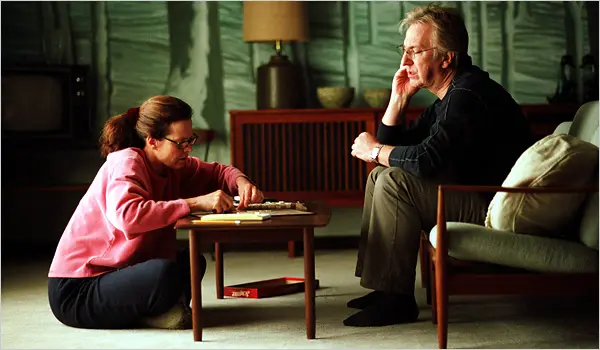Alex Hughes, Alan Rickman’s character in the film “Snow cake,” is a character who carries the burden of his past and seeks to heal from the pain that has permeated his life. Alex is a reserved, withdrawn man whose outer coldness hides a deep inner conflict. His story is a journey from loneliness and guilt to discovering new relationships and coming to terms with his own feelings.

From the very beginning of the film, Alex appears to us as a man haunted by the shadow of tragic events. He comes to Canada from England, trying to distance himself from his past. We do not immediately learn that he has experienced the loss of his son and, unable to cope with this pain, has isolated himself from the world. His body language and lack of unnecessary words say more than his actions – he remains detached and keeps his emotions under control.

A meeting with young Vivienne gives Alex some hope for a dialogue with himself and the world. Her light-heartedness and desire to travel make Alex move away from his gloomy state. But this brief meeting turns into a tragedy when Vivienne dies in a car accident. After this event, Alex goes to her mother, Linda, to inform her of her daughter’s death. It is this trip that changes his life.

Alan Rickman beautifully conveys Alex’s pain and inner conflict through restraint and subtle emotional nuance. In his performance, Alex is a man who does not seek pity or sympathy, but tries to maintain dignity in the face of his suffering. His guilt over his son’s death is intertwined with his new grief over the loss of Vivien, but he does not allow himself to freely express these emotions.

When Alex meets Linda, he finds himself in a completely different world. Linda is an autistic woman who perceives reality in her own way, and her reaction to her daughter’s death would surprise many. She does not cry or show the deep grief that confuses Alex. However, it is through communication with her that he begins to discover new ways of understanding emotions and relationships.
During his stay in Linda’s house, Alex begins to change. At first, he simply performs a duty, trying to help the woman with funeral arrangements, but over time, this task grows into something more. He begins to interact with Linda on her terms, adapting to her unique worldview. Rickman masterfully shows the gradual transformation of the character – from emotional isolation to a deeper acceptance of his own feelings and relationships with other people.

An important element of Alex’s development is his interaction with Maggie, Linda’s neighbor. Maggie is a lively, cheerful woman who is not afraid to tell the truth to Alex’s face. Her openness and simplicity initially irritate Alex, but gradually she becomes an important interlocutor for him and even a hint of a new romantic relationship. Because of her, Alex begins to open up and allow himself to be vulnerable. In the scenes with Maggie, Rickman shows his character from a softer side, demonstrating how he gradually overcomes his inner isolation.

The climax of the film comes when Alex accepts the need for healing. He helps Linda understand and accept the loss of her daughter, but at the same time realizes that he himself must move forward and leave his old pain behind. Alan Rickman conveys this moment with deep emotional accuracy, showing how the hero finds peace in his heart.
In short, Alex Hughes is a character who at the beginning of the film seems withdrawn and almost hopeless, but through interaction with other people and new experiences, he finds a way to emotional liberation. Rickman brilliantly played this role, showing both the quiet inner struggle of the hero and his gradual acceptance of the past and the discovery of new possibilities for happiness.
The text was generated using ChatGPT and edited according to the needs of the resource.



